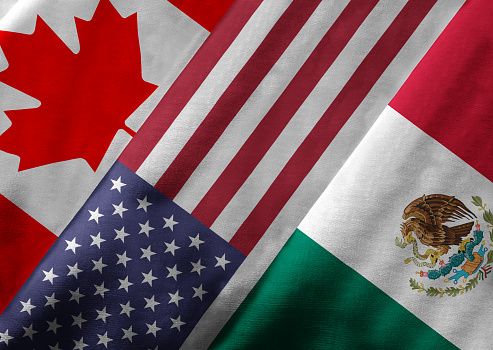 CEOs have offered Donald Trump more than a dozen recommendations ahead of his administration’s landmark trade negotiations with Canada and Mexico, in a clear sign that business is hopeful he will keep goods flowing between America and its second- and third-largest trading partners.
CEOs have offered Donald Trump more than a dozen recommendations ahead of his administration’s landmark trade negotiations with Canada and Mexico, in a clear sign that business is hopeful he will keep goods flowing between America and its second- and third-largest trading partners.
Trump yesterday triggered the 90-day notice period the administration must give Congress to start renegotiating the North American Free Trade Agreement. The president consistently slammed the 24-year-old pact on the campaign trail, claiming it had put Americans out of work, prompting fears from trade advocates that he could scrap it completely.
Last month, Trump said that he won’t target an immediate withdrawal from NAFTA but wouldn’t rule out the possibility should talks sour with counterparts in Canada and Mexico.
The CEO lobby group Business Roundtable, has written a letter to the president to “express support” for his decision to commence negotiations. “We understand the importance of updating this two-decade-old trade agreement to further benefit the U.S. economy and American businesses, workers and consumers,” said the letter, signed by Tom Linebarger, chair of the group’s international engagement committee. He also is CEO of Cummins Inc.
“Since the signing of NAFTA, we have seen our manufacturing industry decimated, factories shuttered, and countless workers left jobless. President Trump is going to change that.”
Far from backing the president’s protectionist rhetoric, the letter goes on to to urge him to “recognize and expand the many benefits” that NAFTA has created for the U.S., including the creation of more than 12 million American jobs. “High-standard and modern trade agreements are critical tools to help American companies and workers access international markets for their U.S.-produced goods and services,” Linebarger said.
To be sure, the letter also acknowledges that the U.S. should strongly enforce its trade laws to combat unfair practices, such as product dumping. Among the 13 priorities Business Roundtable urged the president to consider, was a need to “ensure fair competition with state-owned and controlled enterprises.” The letter also calls for stronger intellectual property protection and a greater ability for U.S. small and medium-sized businesses to enter the Canadian and Mexican markets.
There are no calls, however, for increased trade tariffs often touted by Trump or complaints about currency values. And most of the other recommendations point to the encouragement of even more trade. For example, the letter also urges the president to “eliminate remaining barriers to trade in goods and services and investment and build on NAFTA rules and commitments to ensure coverage of new types of services.”
There also are calls to incorporate regulatory reforms adopted in Mexico and Canada since NAFTA was adopted in 1993, promote e-commerce and digital trade, promote co-operation on infrastructure projects and incorporate stronger labor and environmental protections into the agreement.
Commerce Secretary Wilbur Ross, meanwhile, indicated that negotiations will be tough. “Since the signing of NAFTA, we have seen our manufacturing industry decimated, factories shuttered, and countless workers left jobless. President Trump is going to change that,” he said in a statement.
Mexican and Canadian officials both indicated their readiness to negotiate, but the similarities with Ross’s statement ended there. “This trilateral agreement has been an immense benefit for all parties,” Mexico’s economic ministry said in a statement. “Mexico reaffirms its willingness to update NAFTA.”
Canada was firm in its support, as well. “NAFTA’s track record is one of economic growth and middle-class job creation,” foreign affairs minister Chrystia Freeland said.

Chief Executive Group exists to improve the performance of U.S. CEOs, senior executives and public-company directors, helping you grow your companies, build your communities and strengthen society. Learn more at chiefexecutivegroup.com.
0

1:00 - 5:00 pm
Over 70% of Executives Surveyed Agree: Many Strategic Planning Efforts Lack Systematic Approach Tips for Enhancing Your Strategic Planning Process
Executives expressed frustration with their current strategic planning process. Issues include:
Steve Rutan and Denise Harrison have put together an afternoon workshop that will provide the tools you need to address these concerns. They have worked with hundreds of executives to develop a systematic approach that will enable your team to make better decisions during strategic planning. Steve and Denise will walk you through exercises for prioritizing your lists and steps that will reset and reinvigorate your process. This will be a hands-on workshop that will enable you to think about your business as you use the tools that are being presented. If you are ready for a Strategic Planning tune-up, select this workshop in your registration form. The additional fee of $695 will be added to your total.

2:00 - 5:00 pm
Female leaders face the same issues all leaders do, but they often face additional challenges too. In this peer session, we will facilitate a discussion of best practices and how to overcome common barriers to help women leaders be more effective within and outside their organizations.
Limited space available.

10:30 - 5:00 pm
General’s Retreat at Hermitage Golf Course
Sponsored by UBS
General’s Retreat, built in 1986 with architect Gary Roger Baird, has been voted the “Best Golf Course in Nashville” and is a “must play” when visiting the Nashville, Tennessee area. With the beautiful setting along the Cumberland River, golfers of all capabilities will thoroughly enjoy the golf, scenery and hospitality.
The golf outing fee includes transportation to and from the hotel, greens/cart fees, use of practice facilities, and boxed lunch. The bus will leave the hotel at 10:30 am for a noon shotgun start and return to the hotel after the cocktail reception following the completion of the round.